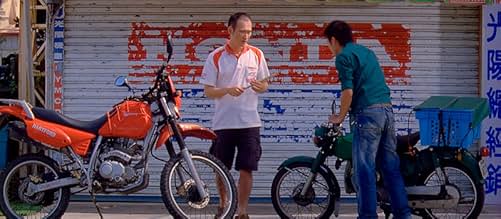IMDb RATING
7.0/10
4.6K
YOUR RATING
A unusual group of people in a village on the coast of Taiwan form a band to perform at a beach concert, while the lead singer searches for the intended recipient of 7 lost love letters.A unusual group of people in a village on the coast of Taiwan form a band to perform at a beach concert, while the lead singer searches for the intended recipient of 7 lost love letters.A unusual group of people in a village on the coast of Taiwan form a band to perform at a beach concert, while the lead singer searches for the intended recipient of 7 lost love letters.
- Awards
- 11 wins & 9 nominations total
Wei-min Ying
- Frog
- (as Wei-Min Ying)
Johnny Chung-Jen Lin
- Old Mao
- (as Johnny C.J. Lin)
Joanne Yang
- Dada
- (as Joanne)
Hsin-Yan Chang
- Meilin - The Hotel Receptionist
- (as Chin-Yen Chang)
Featured reviews
By the time I watched this film, it has broken Taiwan's all time box-office record. Taiwan has no Hollywood, but for decades until recent years, it has produced dozens of movies every year. It's been the hub of Chinese-speaking film making industry and nurtured internationally renowned directors such as Hsiao-hsien Hou, Edward Yang and, of course, Ang Lee. That's why it's a surprise to see what the film has achieved because, whichever way you look at it, it fell short of many high standards set by its predecessors. It's by no means a bad movie though. A warm story executed reasonably well. The elements of romance and certainly music (Taiwan's pop music industry is also well developed) added to its viewing pleasure. Beautiful photography gives extra charms to the tropical town in the southern tip of the island. Acting wise not overall brilliant, but some roles depicting typical local characteristics are particularly lovable. Old Mao is the best example.
Perhaps the underlying reason for the film's popularity is something beyond its plot. Taiwan society, in recent years, has suffered from slow economy, isolation from the world as a result of "One China Policy", and especially the conflict between political parties within the island. People are tired. Tired of struggling to make a living in the big cities and tired of watching confrontations among politics everyday and night on TV. The simple small town lifestyle and good-willed characters demonstrated in the film remind people of the good old days. For two hours, it's like providing an escape for people who have long been trapped or bringing light to people who have long been live in dark. This film will represent Taiwan for the quest of Oscar's best foreign language film. It's not going to win. It's even unlikely to be nominated. But, maybe by accident, this film has achieved something that makes it bigger than winning prizes -- bringing hope to depressed souls!
Perhaps the underlying reason for the film's popularity is something beyond its plot. Taiwan society, in recent years, has suffered from slow economy, isolation from the world as a result of "One China Policy", and especially the conflict between political parties within the island. People are tired. Tired of struggling to make a living in the big cities and tired of watching confrontations among politics everyday and night on TV. The simple small town lifestyle and good-willed characters demonstrated in the film remind people of the good old days. For two hours, it's like providing an escape for people who have long been trapped or bringing light to people who have long been live in dark. This film will represent Taiwan for the quest of Oscar's best foreign language film. It's not going to win. It's even unlikely to be nominated. But, maybe by accident, this film has achieved something that makes it bigger than winning prizes -- bringing hope to depressed souls!
I live in Taiwan and saw this with English subtitles at my local cinema in Tainan. It's not a stunning movie but it is very engaging and charming and best of all depicts many of the charming and engaging qualities of this country. The storyline follows two love affairs - one of 60 years earlier and the other unfolding in the present day. The acting is fine, the humor works well, it is well photographed and the music that pulls several of the subplots together lifts the already high mood and tone into a moving climax.
I'm glad I saw it and feel I know Taiwan a little better through watching this movie - and spent 2 very enjoyable hours doing so.
I'm glad I saw it and feel I know Taiwan a little better through watching this movie - and spent 2 very enjoyable hours doing so.
The title is what I believe after I saw this movie.
Cape No.7 is a great movie and a humble self-introduction of Taiwan. Few that live in mainland China know the real Taiwan. What are the people like? How is their life there? These questions are not merely out of our curiosity; it's more because we care.
Movie has always been a good way of knowing other peoples and cultures. I've always been wanting to know Taiwan through their movies, but the fact is movie industry of Taiwan hasn't been doing well for a long time. If you go to a DVD shop(not to mention cinema) and look for Taiwan movies, mostly, you'll find, or the owner will recommend to you stupid little romances with good-looking faces or extremely low-key boring meaningless experiments(usually in experiments' disguise making erotic stuff), but what we wanna see and the filmmakers in Taiwan should show us is a real Taiwan, a real life of the people. Unlike most other Taiwan movies you can easily find, Cape No.7 is not only a 100% percent authentic Taiwan movie, encouragingly, it's honest and humble too, in order that a real Taiwan will be demonstrated to everyone, including Taiwan natives.
And the effort paid off. We see the beauty of the island, and the beauty of its people. You may think of another movie that is like a place's self-introduction, The Barber of Siberia. Critics say Russia in The Barber of Siberia is not the real Russia, which is not that good in fact. You might feel Taiwan in Cape No.7 is not the real Taiwan either; you might think Taiwan could never be such a nice place. Truthfully, Taiwan has its good and bad things, if there is nothing good in Taiwan and the movie tells you it's good then that's called fake; if there are good things and people, and the movie shows the good to us, why should we say it's not real? There is a time to reveal bad and ugly and there is a time to show good and beauty. Same reasoning with The Barber of Siberia. At this moment, why don't we enjoy seeing a good, beautiful and true Taiwan and hope there are more and more movies like Cape No.7.
Cape No.7 is a great movie and a humble self-introduction of Taiwan. Few that live in mainland China know the real Taiwan. What are the people like? How is their life there? These questions are not merely out of our curiosity; it's more because we care.
Movie has always been a good way of knowing other peoples and cultures. I've always been wanting to know Taiwan through their movies, but the fact is movie industry of Taiwan hasn't been doing well for a long time. If you go to a DVD shop(not to mention cinema) and look for Taiwan movies, mostly, you'll find, or the owner will recommend to you stupid little romances with good-looking faces or extremely low-key boring meaningless experiments(usually in experiments' disguise making erotic stuff), but what we wanna see and the filmmakers in Taiwan should show us is a real Taiwan, a real life of the people. Unlike most other Taiwan movies you can easily find, Cape No.7 is not only a 100% percent authentic Taiwan movie, encouragingly, it's honest and humble too, in order that a real Taiwan will be demonstrated to everyone, including Taiwan natives.
And the effort paid off. We see the beauty of the island, and the beauty of its people. You may think of another movie that is like a place's self-introduction, The Barber of Siberia. Critics say Russia in The Barber of Siberia is not the real Russia, which is not that good in fact. You might feel Taiwan in Cape No.7 is not the real Taiwan either; you might think Taiwan could never be such a nice place. Truthfully, Taiwan has its good and bad things, if there is nothing good in Taiwan and the movie tells you it's good then that's called fake; if there are good things and people, and the movie shows the good to us, why should we say it's not real? There is a time to reveal bad and ugly and there is a time to show good and beauty. Same reasoning with The Barber of Siberia. At this moment, why don't we enjoy seeing a good, beautiful and true Taiwan and hope there are more and more movies like Cape No.7.
This movie is doing well on hype alone, but don't go into it with unrealistic expectations. It is a very well done Taiwanese film which is particularly impressive given its relatively small budget. It's not mind-blowing but it is reasonably well executed, certainly better than a lot of the crap that is out there. It has a good dose of (often local) humour and an interesting storyline and several subplots that unfold at a smooth pace. Performances are more than adequate. Cinematography is top notch. On the down side, there are a few aspects which lacked attention to detail despite the 2 hour+ running time, some loose ends which weren't tied up, and a romance that feels a little more forced than natural. Also some scenes didn't really "work". However, the Japanese letters which link the film together are beautifully written, and definitely add an extra dimension to the overall feel of the experience. Locals should definitely go and support a job well done.
Wow! I just finished seeing this with a group of friends and everybody in the cinema seemed to truly enjoy themselves.
Filmed in Taiwan with a Taiwanese director and mostly local actors, this timeless plot features a small town that must come up with a band comprised of local musicians that will be the opening act for a big beach concert starring a big Japanese star. Will the beautiful Japanese concert coordinator fall for the local boy that has left a musical career in Taipei to return home to become a mailman? Can a band with a 10-year-old keyboardist, a 70-year-old bassist, and various other misfits help put Hengchun on the map?
This may strike some as a Taiwanese version of "The Commitments"/"School of Rock" and, yes, there are a few saccharine moments. Yet, director Wei Te-sheng, a former assistant director under the legendary Edward Yang (director of one of Taiwan's all-time best films, "Yi Yi," IMHO), skillfully pulls everything off without a hitch. Recommended to movie lovers of all ages!
Filmed in Taiwan with a Taiwanese director and mostly local actors, this timeless plot features a small town that must come up with a band comprised of local musicians that will be the opening act for a big beach concert starring a big Japanese star. Will the beautiful Japanese concert coordinator fall for the local boy that has left a musical career in Taipei to return home to become a mailman? Can a band with a 10-year-old keyboardist, a 70-year-old bassist, and various other misfits help put Hengchun on the map?
This may strike some as a Taiwanese version of "The Commitments"/"School of Rock" and, yes, there are a few saccharine moments. Yet, director Wei Te-sheng, a former assistant director under the legendary Edward Yang (director of one of Taiwan's all-time best films, "Yi Yi," IMHO), skillfully pulls everything off without a hitch. Recommended to movie lovers of all ages!
Did you know
- TriviaThe rice wine "Malasun" depicted in the film is actually a virtual brand in the beginning; but at the time of the film's opening, the production company actually brought this wine into existence through cooperation with Hsin-Yi county farmer's association.
Details
- Release date
- Countries of origin
- Official sites
- Languages
- Also known as
- Mũi Đất Số 7
- Filming locations
- Production company
- See more company credits at IMDbPro
Box office
- Budget
- NT$45,000,000 (estimated)
- Gross worldwide
- $18,015,600
- Runtime
- 2h 9m(129 min)
- Color
- Sound mix
- Aspect ratio
- 2.35 : 1
Contribute to this page
Suggest an edit or add missing content





































